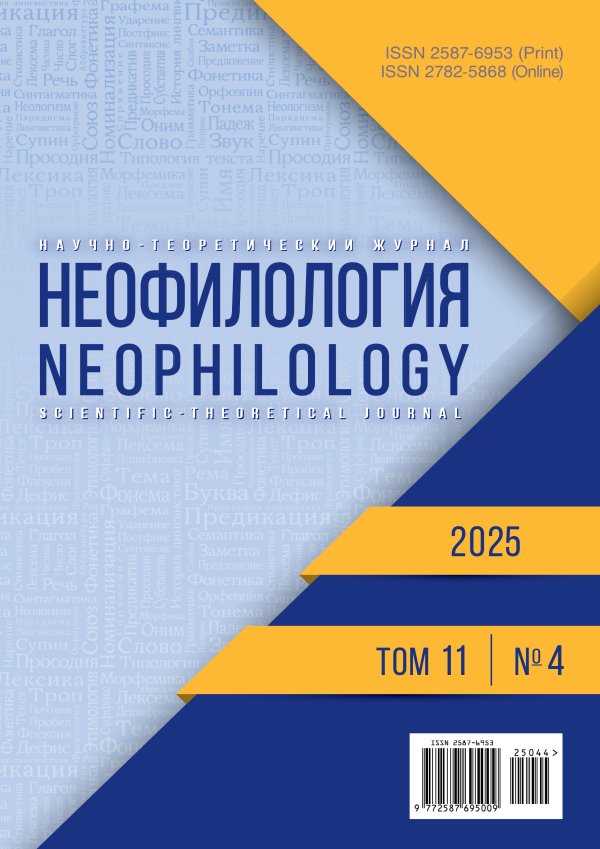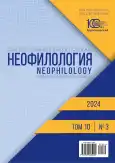Система ценностей как основа построения аргументации риторического жанра
- Авторы: Анисимова Т.В.1
-
Учреждения:
- ФГКОУ ВО «Санкт-Петербургский университет Министерства внутренних дел Российской Федерации», Калининградский филиал
- Выпуск: Том 10, № 3 (2024)
- Страницы: 568-581
- Раздел: РУССКИЙ ЯЗЫК. ЯЗЫКИ НАРОДОВ РОССИИ
- URL: https://bakhtiniada.ru/2587-6953/article/view/295542
- DOI: https://doi.org/10.20310/2587-6953-2024-10-3-568-581
- ID: 295542
Цитировать
Полный текст
Аннотация
ВВЕДЕНИЕ. Сформулирована актуальность исследования и его цель, состоящая в описании иерархии ценностей, являющихся основой риторической аргументации и основным инструментом, необходимым для получения согласия адресата. Конечным этапом этой иерархии является установление ценностной основы каждого риторического жанра.МАТЕРИАЛЫ И МЕТОДЫ. Материалом исследования стали научный и политический дискурсы, в текстах которых с помощью сопоставительного, риторического и контент-анализа были изучены наиболее характерные для них виды ценностей всех уровней.РЕЗУЛЬТАТЫ ИССЛЕДОВАНИЯ. Проанализировано понятие «ценности» в значении, актуальном для риторики. Установлено, что система ценностей, лежащих в основе риторической аргументации, должна строиться отдельно для каждого вида дискурса. Она включает пять основных ярусов, отражающих смысловые доминанты соответствующей сферы общения. Первый уровень занимают универсальные ценности, употребительные во всех сферах общения. Второй уровень составляют базовые ценности, отражающие цели соответствующей сферы общественной деятельности (института). На третьем уровне располагаются личностные ценности, отражающие требуемую модель взаимоотношений участников общения, необходимых для получения запланированного результата. Четвёртый уровень описывает ценности, характерные для каждой отдельной области соответствующего дискурса. Наконец, пятый уровень является жанровым: здесь устанавливается та главная ценность, которая отвечает за единство и эффективность каждого риторического жанра.ЗАКЛЮЧЕНИЕ. Показана связь всех уровней модели и роль каждого уровня в получении запланированного результата.
Об авторах
Т. В. Анисимова
ФГКОУ ВО «Санкт-Петербургский университет Министерства внутренних дел Российской Федерации», Калининградский филиал
Автор, ответственный за переписку.
Email: atvritor@yandex.ru
ORCID iD: 0000-0002-6386-2041
доктор филологических наук, профессор, профессор кафедры социально-экономических и гуманитарных дисциплин
236006, Российская Федерация, г. Калининград, ул. Генерала Галицкого, 30Список литературы
- Молодыченко Е.Н. Ценности и оценка в дискурсе консюмеризма: лингво-прагматический и критический анализ // Вестник Северного (Арктического) федерального университета. Серия: Гуманитарные и социальные науки. 2016. № 3. С. 122-130. https://doi.org/10.17238/issn2227-6564.2016.3.122, https://elibrary.ru/wkxlzd
- Perelman Ch., Olbrehts-Tyteca L. The New Rhetoric: A Treatise on Argumentation. Notre Dame. L., 1969. 566 p.
- Карасик В.И. Лингвокультурные характеристики педагогического дискурса // Вестник МГПУ. Серия «Филология. Теория языка. Языковое образование». 2023. № 2 (50). С. 118-129. https://doi.org/10.25688/2076-913X.2023.50.2.10, https://elibrary.ru/czjenk
- Сердобинцев К.С. О важности философии // Вестник Калининградского филиала Санкт-Петербургского университета МВД России. 2023. № 2 (72). С. 131-135. https://elibrary.ru/fgwiry
- Куликова Э.Г., Акай О.М., Тедеева З.К. Научный дискурс: пределы толерантности (на материале жанра рецензий) // Вестник Российского нового университета. Серия: Человек в современном мире. 2021. № 3. С. 145-153. https://doi.org/10.25586/RNU.V925X.21.03.P.145, https://elibrary.ru/qeleqd
- Никифорова М.В., Чудинов А.П. Варианты и средства репрезентации концептуальной оппозиции «свои – чужие» в дискурсе мэра Екатеринбурга Евгения Ройзмана // Политическая лингвистика. 2016. № 4 (58). С. 154-162. https://elibrary.ru/wkygbv
- Sowinska A., Dubrovskaya T. Discursive construction and transformation of “us” and “them” categories in the newspaper coverage on the US anti-ballistic missile system: Polish versus Russian view // Discourse & Communication. 2012. Vol. 6. № 4. P. 449-468. https://doi.org/10.1177/1750481312457521, https://elibrary.ru/rgijwh
- Андреева П.В. Этос постнеклассической науки // Известия Томского политехнического университета. 2010. Т. 317. № 6. С. 164-167. https://elibrary.ru/nbnlpv
- Лоскутов Ю.В. Философские аспекты этоса современной науки // Новые идеи в философии. 2012. Т. 2. № 20. С. 69-77. https://elibrary.ru/sayfwz
- Сердобинцев К.С. Философия. Методологические и прогностические возможности анализа общественного развития // Вестник Калининградского филиала Санкт-Петербургского университета МВД России. 2020. № 1 (59). С. 90-93. https://elibrary.ru/uamwre
- Pishkova E.Yu. Pre-Election Discourse: Pragmatics and Translation. Ростов-н/Д.: Южный фед. ун-т, 2016. 120 с. https://elibrary.ru/xrjlbd
- Хомутова Т.Н., Наумова К.А. Военно-политический дискурс как особый тип дискурса // Вестник Южно-Уральского государственного университета. Серия: Лингвистика. 2017. Т. 14. № 3. С. 49-53. https://doi.org/10.14529/ling170307, https://elibrary.ru/zezcpx
- Парламентский дискурс: социокультурные практики и языковое воплощение / Т.А. Ширяева, Л.И. Триус, А.Ю. Багиян, Ю.А. Черноусова, О.М. Литвишко. Казань: Бук, 2020. 148 с. https://elibrary.ru/onrqgu
- Чудинов А.П. Дискурсивные характеристики политической коммуникации // Политическая лингвистика. 2012. № 2 (40). С. 53-59. https://elibrary.ru/pcavqp
- Анисимова Т.В. Некоторые принципы разграничения риторических жанров // Вестник Волгоградского государственного университета. Серия 2: Языкознание. 2005. № 4. С. 54-57. https://elibrary.ru/jvkhgb
- Данилевская Н.В. Научный текст как динамика оценочных действий // Вестник Пермского университета. Российская и зарубежная филология. 2009. № 2. С. 20-28. https://elibrary.ru/jxrjqp
- Чаплыгин В.Г. Рецензия на коллективную монографию «Управление интеллектуальным капиталом в экономике знаний». Минск: Ин-т бизнеса БГУ, 2021. 139 с. // Вестник Калининградского филиала Санкт-Петербургского университета МВД России. 2021. № 2 (64). С. 152-153. https://elibrary.ru/cjmgfm
- Тумайкин И.В. Риски имитационности в российской науке // Философские проблемы: вчера, сегодня, завтра: ежегодный сб. науч. ст. Ростов н/Д.: Изд-во Ростов. гос. эконом. ун-та (РИНХ), 2016. С. 140-150. https://elibrary.ru/ylwmbt
- Хазагеров Г.Г. Риторический манифест. Ростов н/Д.: Изд-во Ростов. риторической школы, 2020. 45 с.
Дополнительные файлы











